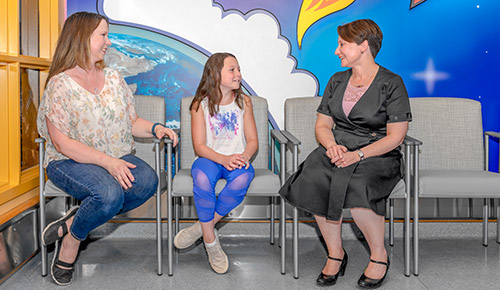
Childhood cancer survivor Lynette Stanley-Maddocks (left) moved from British Columbia to Alberta as an adult to be near the Stollery Children's Hospital and pediatric oncologist Maria Spavor's Northern Alberta Childhood Cancer Survivor Program, where young patient Taryn Baillie (centre) has already had several years of checkups to monitor late effects of cancer treatment.
Twenty-seven years ago, Lynette Stanley-Maddocks was diagnosed with Hodgkin's Lymphoma. After many rounds of both chemotherapy and radiation, she became cancer-free. Just a teenager at the time, she was eager to get back into the world and live a normal life-which she did. She became a lawyer, got married, had two sons, and moved to the beautiful Gulf Islands in British Columbia. "For the first 17 years afterwards, I was blissfully unaware that anything could go wrong-which is both a blessing and a curse," she says.
The first sign of trouble came when she was 38 years old and her periods stopped. Then, she began having hot flashes. Too young for menopause, Stanley-Maddocks wondered if her symptoms might be related to her cancer experience and did some online sleuthing. To her horror, she discovered that survivors of Hodgkin's Lymphoma were at high risk of developing a long list of health issues many years after treatment. She also found medical guidelines for monitoring the health of survivors like herself and realized she should have begun receiving regular breast cancer screenings years before. "I started reading that and freaked out," she says.
Stanley-Maddocks made an appointment with her family physician to ask for a mammogram. After more sleuthing online, she found out about the Northern Alberta Childhood Cancer Survivor Program at the Stollery Children's Hospital, which follows survivors of childhood cancers well into adulthood. Realizing she needed access to the right health care, Stanley-Maddocks and her family moved to Edmonton to be near the clinic.
Maria Spavor, the clinic's medical director, explains that it's only fairly recently that medicine has understood the long-term impact of cancer treatments. "Over the last 50 years, survival rates have increased dramatically and now the cure rate for childhood cancer is more than 82 per cent," she says. "Oncologists have discovered that chemotherapy and radiation can cause late effects." Research shows that 70 per cent of survivors will develop at least one late effect and 40 per cent of these health issues will be life threatening.
Late effects can be both medical (like secondary cancers and endocrine dysfunction) and emotional (like Post-Traumatic Stress Disorder). In the early 2000s, the Institute of Medicine called for the standardized follow-up of childhood cancer survivors. Within North America, the Children's Oncology Group developed standardized, treatment exposure-based screening guidelines for caring for patients long-term. This includes timelines for screening for the health issues they were at high risk of developing. Spavor explains that this was an important development since early detection and treatment often leads to better outcomes for patients.
A few years after moving to Edmonton, Stanley-Maddocks had a routine screening at the clinic that caught early-stage, radiation-induced breast cancer-one of the most aggressive forms of breast cancer. Not long after, another test revealed that she had cardiomyopathy even though she had yet to show symptoms. When it comes to the benefits of the clinic, Stanley-Maddocks doesn't mince words: "Without a late-effects program to monitor me, I would be dead."
Of course, the aim of the clinic is actually to follow patients right from childhood into adulthood, so many of the clinic's patients are children as young as three-years-old. Taryn Baillie is one of these patients. Now 11, she was diagnosed with Acute Myeloid Leukemia (AML) at just five-and-a-half months old. It took five rounds of chemotherapy to destroy the cancer, but she has remained cancer-free ever since.
Her mom, Dione, explains that from the very beginning, physicians spoke of the possibility of health issues down the road. "They kind of laid it all out there," she says. While her daughter is an active pre-teen without a care in the world, Dione remains ever watchful. For the last 10 years, she has been happy to take her daughter for yearly check-ups at the late effects clinic, complete with blood work and heart tests. "I'm sure she hates going, but I like going every year just to know everything's good," she says.